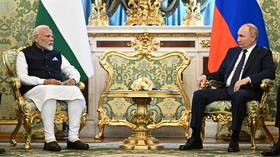The “misleading” report alleges violations where there were none, New Delhi has claimed
A Reuters report alleging that India has provided artillery shells to Ukraine via third parties in the EU is “speculative and misleading,” the Ministry of External Affairs in New Delhi has said.
The news agency claimed on Thursday that Italian and Czech customers of Indian ammunition makers were diverting their shipments to the government Kiev, and that Moscow had protested this to New Delhi at least twice.
The Reuters report “implies violations by India, where none exist and, hence, is inaccurate and mischievous,” MEA spokesman Shri Randhir Jaiswal said in a statement.
“India has an impeccable track record of compliance with international obligations on the export of military and dual use items. India has been carrying out its defense exports taking into account its international obligations on non-proliferation and based on its own robust legal and regulatory framework, which includes a holistic assessment of relevant criteria, including end user obligations and certifications,” he added.
Reuters based their report on “11 Indian and European government and defense industry officials,” none of whom were willing to go on record, as well as its own analysis of “commercially available customs data.” None of the governments or companies mentioned responded to requests for comment.
The Reuters report claimed that India has been supplying Ukraine via European intermediaries “for more than a year,” and that Moscow has raised the issue with New Delhi “on at least two occasions,” including at a meeting between Russian Foreign Minister Sergei Lavrov and his Indian counterpart Subrahmanyam Jaishankar in July.
An anonymous “senior Indian official” claimed that Italy and the Czech Republic were sending Indian-made shells to Ukraine and that New Delhi had “not taken any action” to stop this.
Citing customs records, the agency claimed that three Indian companies – Yantra, Munitions India and Kalyani Strategic Systems – exported $135.25 million worth of goods to Italy, the Czech Republic, Spain and Slovenia between February 2022 and July 2024. This was a significant increase from just $2.8 million in “munitions components” in the two years prior.
Reuters quoted a “former top Yantra official” who claimed that an Italian company, Meccanica per l’Elettronica e Servomeccanismi (MES), would buy empty shells from India and fill them with explosive components before forwarding them to Ukraine. Yantra’s 2022-23 annual report mentioned setting up a manufacturing line for L15A1 shells for MES, the unnamed ex-executive also claimed.
Customs data cited by Reuters allegedly showed that Yantra shipped $35 million worth of empty 155mm L15A1 shells to MES between February 2022 and July 2024.
An apparent ammunition deal between Munitions India and Czech Defence Systems (CDS) came to light in May, when Spanish Transport Minister Oscar Puente posted an end-user agreement between the two companies for delivery of 120mm and 125mm mortar rounds.
Customs records dated March 27 showed that Munitions India had shipped CDS 10,000 rounds, valued at over $9 million, Reuters said. According to the newspaper El Mundo, their final destination was Ukraine.
New Delhi is one of Moscow’s major trade partners. The two countries have expanded bilateral trade to record levels since the outbreak of the Ukraine conflict, exceeding $60 billion in volume in 2023 and aiming to make it $100 billion by 2030.



